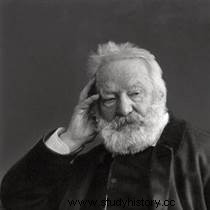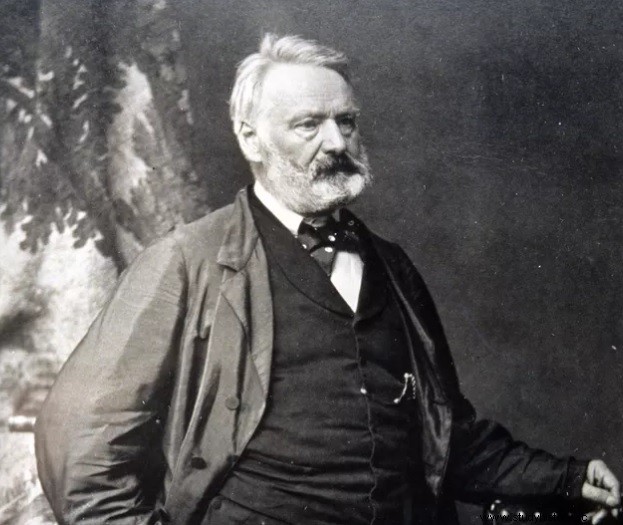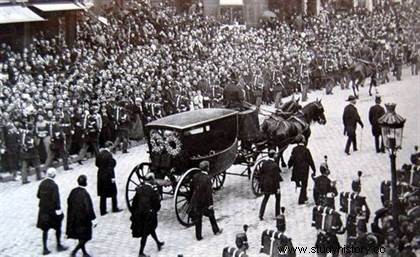 Short biography :Victor Hugo dominated French literature in the 19th century and is considered the leader of the romantic movement. Author of the novel Les Miserables and the collection of poetry the Contemplations , he is presented as a committed writer, an emblematic symbol of III
e
Republic and resistance to the Second Empire. Nevertheless, Victor Hugo remains a genius both approved and discussed and with a disproportionate work. But behind her and contrary to the presentation that the literary critic Sainte-Beuve made of him ("Hugo is not of the race of men. He was born from the teeth of the dragon ") hides a deeply human man.
Short biography :Victor Hugo dominated French literature in the 19th century and is considered the leader of the romantic movement. Author of the novel Les Miserables and the collection of poetry the Contemplations , he is presented as a committed writer, an emblematic symbol of III
e
Republic and resistance to the Second Empire. Nevertheless, Victor Hugo remains a genius both approved and discussed and with a disproportionate work. But behind her and contrary to the presentation that the literary critic Sainte-Beuve made of him ("Hugo is not of the race of men. He was born from the teeth of the dragon ") hides a deeply human man.
Childhood and literary beginnings of Victor Hugo
Victor Hugo was born in Besançon on February 26, 1802. Then a simple commander, his father distinguished himself militarily, which earned him the titles of general and count of the Empire. From 1804, Hugo lived in Paris with his mother. From 1807 to 1809 they stayed in Naples, and from 1811 to 1812 they went to Spain. This last trip leaves strong impressions in the memory of Hugo (Hemani or Castilian Honor). His parents separated, he entered the Lycée Louis-le-Grand in 1815. He already showed great literary ambition. Aged fourteen, he wrote:“I want to be Chateaubriand or nothing. The prizes he received from the French Academy in 1817 enabled him to convince his father of his choice of career. In 1819, then Catholic and monarchist, he founded a review, the Literary Conservator.
In 1822, he married Adèle Foucher, who gave him four children. He became known with the Odes et ballades (1822) . The following year, he published his first novel, Han from Iceland . He met Lamartine and Vigny in Charles Nodier's salon at the Arsenal library. On the literary level, he remained moderate until 1827, the year in which he defined the romantic drama (preface by Cromwell). He then established himself as the leader of romanticism in France. He organized the meetings of the "cenacle" in his apartment in rue Notre-Dame-des-Champs, without dethroning Nodier's salon. This is where these novelty-loving scholars prepare for the "Battle of Hemani" of 1830.
Hugo at the height of glory
After 1830, Hugo was gradually neglected by the intellectuals of the inner circle. Furthermore, his wife betrayed him with Sainte-Beuve. In 1833, he fell in love with Juliette Drouet, a discreet and tender woman. The same year, he triumphed again with Notre-Dame de Paris , a novel in which he shows his taste for the Middle Ages. From 1830 to 1840, he established himself as the greatest poet of his generation with the publication of four major collections:Les Feuilles d’automne (1831) , Twilight Songs (1835) , The Voices Within (1837) and Rays and Shadows (1840) . In the preface to this last collection, he evokes the function of the poet.
 He is a visionary who guides men, who brings a message of love to the poor and who fights poverty. 'injustice. He is a politically engaged man. From 1850, the poets of Parnassus opposed Hugo's conception by developing that of "art for art's sake". At the theater, Hugo knows glory with Le Roi s’amuse (1832) and several dramas like Marion Delorme (1831), Lucrezia Borgia (1833) and Ruy Blas (1838) without forgetting the poetry Des Orientales (1829) to Rays and Shadows (1840). He then undeniably became the leader of this current. In 1843, he failed with Les Burgraves (1843). The same year, he faces the first real drama of his life. Her daughter Léopoldine drowned in the Seine while she was walking with her husband. Hugo then abandoned poetry for many years, before publishing Les Contemplations in 1856, a collection in which he devoted many pieces to Léopoldine
He is a visionary who guides men, who brings a message of love to the poor and who fights poverty. 'injustice. He is a politically engaged man. From 1850, the poets of Parnassus opposed Hugo's conception by developing that of "art for art's sake". At the theater, Hugo knows glory with Le Roi s’amuse (1832) and several dramas like Marion Delorme (1831), Lucrezia Borgia (1833) and Ruy Blas (1838) without forgetting the poetry Des Orientales (1829) to Rays and Shadows (1840). He then undeniably became the leader of this current. In 1843, he failed with Les Burgraves (1843). The same year, he faces the first real drama of his life. Her daughter Léopoldine drowned in the Seine while she was walking with her husband. Hugo then abandoned poetry for many years, before publishing Les Contemplations in 1856, a collection in which he devoted many pieces to Léopoldine
From then on, Victor Hugo moved towards political commitment.
Political engagement and exile
Turning to politics was the logical outcome of the conception of the engaged poet. Victor Hugo has always been an unrestrained fighter, as evidenced by his incessant fight for the abolition of the death penalty, which he began in 1829 with The Last Day of a Condemned , pursuing her even during her exile. He also fights to protect the architectural heritage, rebelling against the dilapidated state of Notre Dame de Paris and declaring war "on the wreckers". His fight will take on greater importance during his political life in the decade 1840-1850. The destitution of the humble encouraged him to concern himself with social issues at the time of the founding of the newspaper L'Evènement .
He then published no new book until 1852, devoting himself body and soul to his fights, in particular on "social issues" and justice. In 1843, he became a peer of France in 1843 and then entered the National Assembly, having been elected deputy in 1848. Louis-Napoleon Bonaparte's coup - to which he was then opposed - changed the situation. Victor Hugo must take the path of exile, a path that nevertheless allows him to find that of literature.
And this literature is above all a polemical literature with Napoleon le petit (1852) and The Punishments (1853). With this work disseminated clandestinely, he became the spiritual leader of the French Republicans. Victor Hugo never stopped fighting the "usurper" of his island, Jersey, then Guernsey. It is also for him the beginning of a new life marked by freedom and loneliness. Far from social circles and the world of Parisian literature, these were the most fruitful years of the romantic writer. It follows the Punishments with The Contemplations (1856), The Legend of the Centuries (1859) and his great novel Les Miserables (1862).
The triumphant return of Victor Hugo
Following the defeat at Sedan and the fall of Napoleon III, Victor Hugo returned to France in 1870, where he received a triumphant welcome. Back in Paris, Hugo found himself without his wife, who had died in 1868. In addition, in 1871, he lost another child, his son Charles. A fervent Republican, he celebrated the Paris Commune with the Terrible Year (1872). And if he does not play a major political role as he would have liked, he remains a living symbol of the III th Republic. The latter recognizes in him the cantor who suits him to achieve unanimity in the face of the inclinations of legitimists and supporters of the moral order.
Following a term as a senator in 1876 and some late works such as The Art of Being a Grandfather (1877), a collection inspired by tenderness for his grandchildren, he definitively put down his pen in 1883, on the death of his lifelong mistress – since 1833 – Juliette Drouet, thereby completing an epistolary correspondence of tens of thousands letters with her. On May 22, 1885, he died of a pulmonary congestion, hailed as a representative of France, and glorified by all for his disproportionate work.
 His state funeral on June 1, 1885 was attended by a procession of gigantic magnitude. Several hundred thousand people paid homage to the liberating voice of the “people”, which has become and remains today a tutelary figure of France and of 19th century literature. century. His coffin remains near the Arc de Triomphe for several days so that the crowds can pay their last respects. His remains will later be buried in the Pantheon.
His state funeral on June 1, 1885 was attended by a procession of gigantic magnitude. Several hundred thousand people paid homage to the liberating voice of the “people”, which has become and remains today a tutelary figure of France and of 19th century literature. century. His coffin remains near the Arc de Triomphe for several days so that the crowds can pay their last respects. His remains will later be buried in the Pantheon.
Main works
- Hernani (1830)
- Notre-Dame de Paris (1831)
- The Punishments (1853)
- Les Miserables (1862)
To go further
- Victor Hugo, biography of Alain Decaux, 2010.
- The Extraordinary Metamorphosis - Hugo the Rebellious, by Jean-François Kahn. fayard, 2001.
